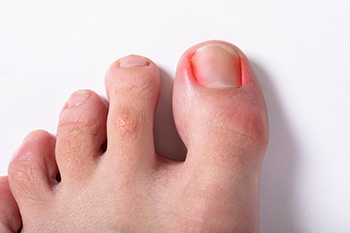
 You probably have an ingrown toenail (onychocryptosis) if the edge of your toenail grows into the skin of your toe. The area around the nail will likely be red and painful because it is irritated. If it progresses to infection, the skin might bulge around the nail and pus, or a clear fluid can be present. It stands to reason that the longer this condition is left untreated, the more likely it is to become infected. Ingrown toenails may be caused by wearing shoes that crowd the toenails, improper cutting of toenails, injury to the toenail, or toenails that are unusually curved. If you suspect you have an ingrown toenail or any other foot discomfort, you should visit a podiatrist for proper diagnosis and treatment.
You probably have an ingrown toenail (onychocryptosis) if the edge of your toenail grows into the skin of your toe. The area around the nail will likely be red and painful because it is irritated. If it progresses to infection, the skin might bulge around the nail and pus, or a clear fluid can be present. It stands to reason that the longer this condition is left untreated, the more likely it is to become infected. Ingrown toenails may be caused by wearing shoes that crowd the toenails, improper cutting of toenails, injury to the toenail, or toenails that are unusually curved. If you suspect you have an ingrown toenail or any other foot discomfort, you should visit a podiatrist for proper diagnosis and treatment.
Ingrown toenails can become painful if they are not treated properly. For more information about ingrown toenails, contact Dr. Todd Goldberg of Complete Family Foot Care Center. Our doctor can provide the care you need to keep you pain-free and on your feet.
Ingrown Toenails
Ingrown toenails occur when a toenail grows sideways into the bed of the nail, causing pain, swelling, and possibly infection.
Causes
Prevention
Because ingrown toenails are not something found outside of shoe-wearing cultures, going barefoot as often as possible will decrease the likeliness of developing ingrown toenails. Wearing proper fitting shoes and using proper cutting techniques will also help decrease your risk of developing ingrown toenails.
Treatment
Ingrown toenails are a very treatable foot condition. In minor cases, soaking the affected area in salt or antibacterial soaps will not only help with the ingrown nail itself, but also help prevent any infections from occurring. In more severe cases, surgery is an option. In either case, speaking to your podiatrist about this condition will help you get a better understanding of specific treatment options that are right for you.
If you have any questions please feel free to contact our office located in Littlestown, PA . We offer the newest diagnostic and treatment technologies for all your foot and ankle needs.